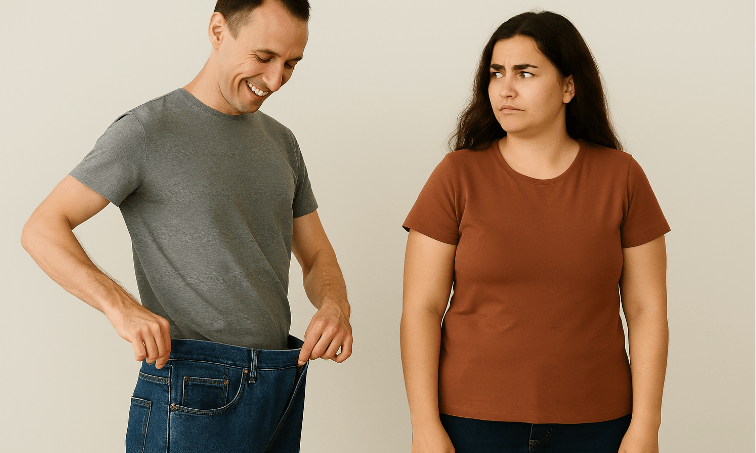When it comes to weight loss, men and women often face different challenges. While the fundamentals of weight loss (burning more calories than you consume) apply to everyone, men and women often experience very different journeys due to biological, hormonal, and psychological factors. Understanding these differences can help tailor more effective and sustainable weight loss strategies for each gender.
1. Metabolism: Men Burn More Calories at Rest
One of the most obvious differences is the basal metabolic rate (BMR), the number of calories your body burns at rest. On average, men have more muscle mass and less body fat than women. Since muscle burns more calories than fat, men tend to have a higher BMR, giving them a natural metabolic advantage.
This means that when a man and a woman follow the same calorie-restricted diet, the man is likely to lose weight faster in the early stages.
2. Fat Storage: Different Patterns, Different Challenges
Women’s bodies are biologically trained to store fat for fertility and childbearing, particularly around the hips, thighs, and buttocks. Men tend to store fat in the abdominal area, which is more metabolically active and easier to shed with diet and exercise.
This difference makes fat loss more stubborn for women, especially post menopause, when hormonal shifts make fat storage around the midsection more common.
3. Hormones: A Powerful Influence
Hormones like estrogen, progesterone, and testosterone play key roles in how each gender reacts to food, exercise, and fat storage.
– Women experience monthly hormonal fluctuations that affect appetite, energy levels, and mood. For example, during the luteal phase of the menstrual cycle, cravings and hunger can increase.
– Men have more stable levels of testosterone, which helps build and maintain muscle mass, further supporting fat burning potential.
– Stress hormones like cortisol can affect both sexes, but women are often more influenced by emotional eating patterns triggered by stress.
4. Exercise Response: Strength vs Endurance
Men often see faster results from resistance training thanks to higher testosterone levels that promote muscle growth. Women may benefit more from a mix of strength and endurance training, though they might not gain muscle as quickly.
However, studies show that women are generally better at fat oxidation during endurance exercise, suggesting they burn a higher percentage of fat compared to men during steady state cardio.
5. Psychological and Social Factors
Weight loss isn’t just physical; it’s deeply emotional. Research suggests that:
– Women may face greater social pressure to lose weight, which can lead to unhealthy dieting patterns or emotional distress.
– Men, on the other hand, might be more likely to approach weight loss from a performance or strength-focused angle, often relying on gym routines rather than diet alone.
Support systems, body image perceptions, and motivation types often vary greatly between genders and can influence the success and sustainability of weight loss efforts.
6. Are Some Diets Better Suited to Men or Women?

Yes, some diets may work better depending on hormonal profiles, metabolism, and lifestyle habits. For example:
– High protein, low carb diets like keto or paleo often suit men well due to their higher muscle mass and calorie needs.
– Women may benefit from balanced diets that are lower in restrictive rules and higher in nutrients that support hormonal health, like complex carbs, healthy fats, and fiber.
– Additionally, intermittent fasting may work well for men but can disrupt hormonal balance in women if not practiced carefully.
7. Should You Choose a Weight Loss Plan Based on Gender?

Not necessarily, but gender should be a factor in customizing your approach. While there’s no one size fits all male or female diet, considering hormonal balance, stress levels, body composition, and lifestyle will help create a plan that works for you.
A personalized strategy that considers your body, your goals, and your biology is far more effective than following a generic trend, regardless of your gender.
The Key to Sustainable Weight Loss
While men may often experience quicker initial results, women are just as capable of achieving and maintaining a healthy weight with strategies that respect their unique physiology and lifestyle. Understanding these biological and psychological differences isn’t about competition; it’s about customizing the journey so that everyone can succeed.
Whether you’re male or female, the key to sustainable weight loss lies in consistency, patience, and a healthy relationship with your body.
Celine Saad
Product Development Officer







